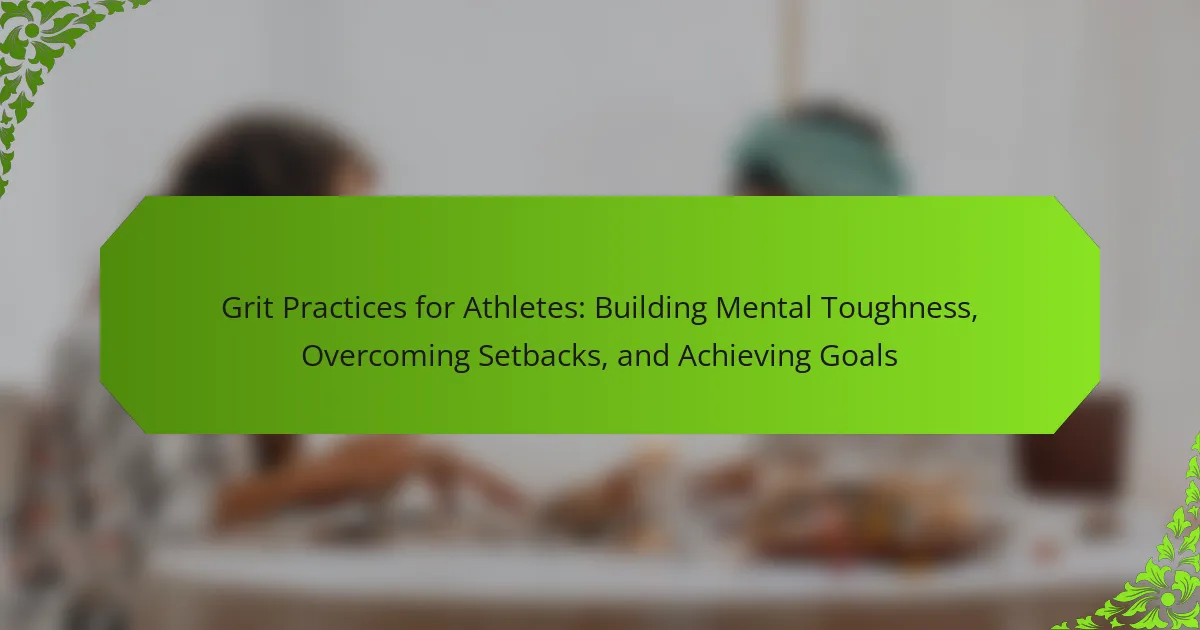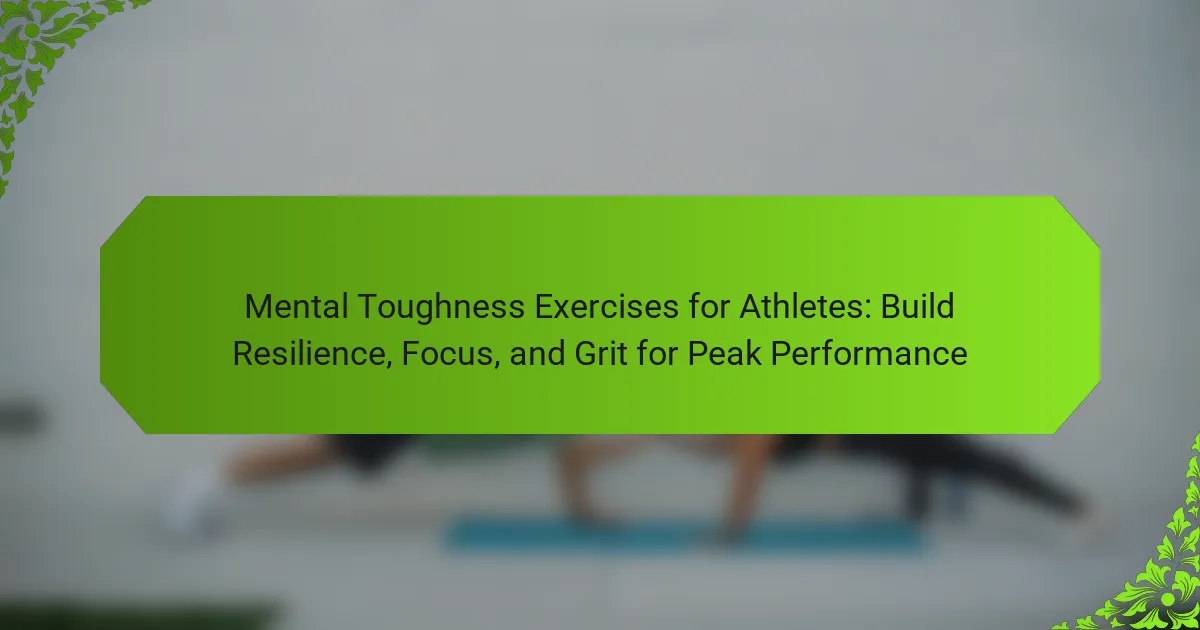Building resilience is essential for amateur athletes seeking to overcome challenges and achieve long-term goals. Athlete grit and determination stem from mental toughness, consistent practice, and the ability to embrace challenges. Key strategies include setting specific goals, cultivating a growth mindset, and maintaining a supportive environment. These approaches enhance performance and commitment, ultimately fostering a robust foundation of resilience.

What is Grit and How Does It Relate to Amateur Athletes?
Grit is the perseverance and passion for long-term goals, crucial for amateur athletes. It fosters resilience, enabling them to overcome challenges through mental toughness and consistent practice. Studies show that gritty athletes are more likely to achieve their objectives, as they maintain focus despite setbacks. Developing grit involves setting clear goals, embracing challenges, and cultivating a growth mindset. This mental attribute can significantly enhance performance and commitment in sports, making it essential for aspiring athletes.
Why is Mental Toughness Crucial for Athletic Success?
Mental toughness is crucial for athletic success as it fosters resilience, enabling athletes to overcome challenges and maintain focus. This psychological strength helps athletes push through physical and mental barriers during training and competition. Studies indicate that mental toughness significantly correlates with performance outcomes, with resilient athletes often achieving higher levels of success. Consistent practice reinforces mental toughness, creating a cycle of improvement and confidence.
How Can Consistent Practice Enhance Resilience?
Consistent practice significantly enhances resilience by fostering mental toughness in athletes. Regular engagement in training builds habits that strengthen focus, adaptability, and perseverance. As a result, athletes develop grit, which is essential for overcoming challenges and setbacks. Research shows that athletes who practice consistently are more likely to maintain motivation and achieve long-term goals. This commitment to practice cultivates a unique attribute of resilience, enabling athletes to thrive under pressure and improve performance over time.

What Are the Universal Attributes of Resilience in Sports?
Resilience in sports is defined by mental toughness, consistent practice, and the ability to overcome adversity. Key attributes include perseverance, focus, adaptability, and emotional regulation. Athletes with high grit demonstrate a unique attribute: they maintain motivation over long periods, essential for achieving long-term goals. Studies show that mental toughness correlates with improved performance, highlighting the importance of resilience in competitive environments. Resilience not only aids in overcoming setbacks but also fosters a growth mindset, allowing athletes to learn from failures and enhance their skills.
What Role Does Goal Setting Play in Building Grit?
Goal setting is essential for developing grit in athletes. It provides direction, enhances focus, and fosters resilience. Specific, measurable goals help athletes track progress, maintain motivation, and overcome challenges. Research shows that athletes with clear goals demonstrate higher levels of determination and mental toughness. By breaking larger objectives into smaller milestones, athletes build confidence and perseverance, reinforcing their grit over time.
How Does Self-Discipline Contribute to Athletic Resilience?
Self-discipline significantly enhances athletic resilience by fostering mental toughness and consistent practice. Athletes who cultivate self-discipline develop the ability to push through challenges and setbacks, which is crucial for long-term success.
Research indicates that self-discipline correlates with improved performance metrics, as disciplined athletes often adhere to rigorous training regimens and nutritional plans. This commitment not only builds physical endurance but also reinforces a resilient mindset, enabling athletes to remain focused during competitions.
Moreover, self-discipline cultivates a unique attribute: the ability to set and achieve specific goals. Athletes who consistently practice self-discipline are more likely to experience incremental progress, which boosts their confidence and reinforces their determination.
In summary, self-discipline is a foundational element that contributes to athletic resilience, allowing athletes to thrive under pressure and maintain their commitment to excellence.
What Importance Does a Positive Mindset Have for Athletes?
A positive mindset is crucial for athletes as it enhances performance and resilience. Mental toughness allows athletes to overcome challenges, maintain focus, and sustain motivation during training and competition. Research indicates that athletes with a positive outlook are more likely to set and achieve goals, leading to improved outcomes. Additionally, a strong mental framework fosters adaptability, enabling athletes to bounce back from setbacks and learn from failures. This resilience is a unique attribute that distinguishes successful athletes in high-pressure environments.

What Unique Practices Foster Grit in Amateur Athletes?
Unique practices that foster grit in amateur athletes include setting specific goals, maintaining a growth mindset, and embracing challenges. These approaches build resilience and enhance mental toughness.
Setting specific goals helps athletes focus their efforts and measure progress. A growth mindset encourages them to view failures as learning opportunities, which is crucial for long-term development. Embracing challenges allows athletes to push their limits and develop perseverance.
Additionally, consistent practice routines reinforce discipline and commitment, essential components of grit. Engaging in reflective practices, such as journaling, can also enhance self-awareness and motivation.
Incorporating these unique practices cultivates a robust foundation of grit, enabling amateur athletes to overcome obstacles and achieve their objectives.
How Can Visualization Techniques Improve Performance?
Visualization techniques enhance athlete performance by fostering mental resilience and focus. These techniques enable athletes to mentally rehearse their actions, improving confidence and reducing anxiety. Research indicates that visualization can lead to a 25% increase in performance metrics, particularly in high-pressure situations. By consistently practicing visualization, athletes build a unique mental framework that aligns with their grit and determination, ultimately enhancing their competitive edge.
What Are the Benefits of Journaling for Athletes?
Journaling enhances athletes’ mental toughness, resilience, and focus. It allows for self-reflection, goal setting, and emotional regulation. Athletes can track progress, identify strengths and weaknesses, and develop strategies for improvement. Research shows that consistent journaling can lead to increased motivation and better performance outcomes.
How Can Peer Support Systems Enhance Grit?
Peer support systems significantly enhance athlete grit by fostering resilience through shared experiences and encouragement. These systems provide athletes with emotional backing, promoting mental toughness during challenging times. Research shows that athletes involved in peer support report higher levels of determination and a greater ability to cope with setbacks. Additionally, consistent practice within these support frameworks cultivates a sense of accountability, driving athletes to maintain their commitment to training and performance.

What Rare Attributes Distinguish Highly Resilient Athletes?
Highly resilient athletes often exhibit rare attributes such as exceptional adaptability, unwavering focus under pressure, and a profound sense of purpose. These attributes distinguish them from their peers, allowing them to thrive in challenging situations. For example, adaptability enables athletes to adjust their strategies in response to unexpected obstacles. Unwavering focus helps maintain performance consistency, while a strong sense of purpose drives them to push through adversity. These rare attributes collectively enhance their mental toughness and resilience, reinforcing their commitment to consistent practice and improvement.
What Is the Impact of Emotional Intelligence on Grit?
Emotional intelligence significantly enhances athlete grit by fostering resilience and determination. Athletes with high emotional intelligence can better manage stress, maintain focus, and recover from setbacks. This capability leads to increased perseverance in training and competition. Research indicates that emotionally intelligent athletes are more adaptable, allowing them to navigate challenges effectively and sustain their motivation. Consequently, emotional intelligence is a unique attribute that directly influences the development of grit in athletes, promoting long-term success in their sports careers.
How Does Adaptability Influence Athletic Performance?
Adaptability significantly enhances athletic performance by fostering resilience and mental toughness. Athletes who embrace change can better handle challenges and setbacks, leading to improved outcomes in training and competition.
Research indicates that mental toughness, a unique attribute of adaptable athletes, correlates with higher performance levels. For instance, athletes who consistently practice adaptability techniques report increased confidence and focus during high-pressure situations. This consistent practice reinforces their grit, allowing them to remain determined despite obstacles.
Furthermore, adaptability aids in strategic decision-making during competitions. Athletes who can adjust their tactics in real-time often outperform their less flexible counterparts. This ability to pivot, coupled with relentless practice, cultivates a mindset geared toward success.
In summary, adaptability influences athletic performance by enhancing resilience, fostering mental toughness, and improving strategic execution, ultimately leading to greater achievement in sports.
What Unique Experiences Shape Resilience in Athletes?
Unique experiences such as overcoming injuries and facing intense competition significantly shape resilience in athletes. These challenges foster mental toughness and grit, essential for consistent practice and performance. Athletes often develop coping strategies through adversity, enhancing their ability to persist under pressure. Studies show that athletes who experience setbacks often demonstrate greater resilience, as they learn to adapt and grow from these experiences.

How Can Amateur Athletes Implement Grit-Building Strategies?
Amateur athletes can implement grit-building strategies by focusing on consistent practice, setting challenging goals, and maintaining a positive mindset. Developing resilience requires a commitment to pushing through difficulties and learning from failures.
1. Establish a routine: Regular training schedules foster discipline and promote mental toughness.
2. Set specific, measurable goals: Clear objectives enhance motivation and provide a sense of achievement.
3. Embrace challenges: Facing obstacles head-on builds confidence and grit.
4. Reflect on experiences: Analyzing both successes and failures aids in personal growth.
5. Cultivate a supportive environment: Surrounding oneself with encouraging peers strengthens determination.
These strategies collectively enhance an athlete’s mental toughness, ultimately leading to improved performance and resilience.
What Are the Best Practices for Developing Mental Toughness?
To develop mental toughness, athletes should focus on consistent practice, setting clear goals, and embracing challenges. Building resilience involves cultivating a positive mindset, learning from failures, and maintaining discipline. Additionally, visualization techniques and mindfulness can enhance focus and emotional control. Engaging in regular physical training also contributes to mental fortitude, reinforcing the connection between body and mind.
What Common Mistakes Should Athletes Avoid When Building Resilience?
Athletes should avoid overtraining, neglecting mental health, setting unrealistic goals, and ignoring recovery. These mistakes can hinder resilience and overall performance. Overtraining leads to burnout, while neglecting mental health reduces focus and motivation. Unrealistic goals create frustration, and ignoring recovery increases injury risk. Addressing these issues fosters mental toughness and consistent practice.
How Can Athletes Measure Their Progress in Grit Development?
Athletes can measure their progress in grit development through consistent self-assessment and tracking specific mental resilience metrics. Regular reflection on challenges faced and goals achieved helps gauge improvement.
Key methods include maintaining a daily journal to document experiences, setting measurable goals, and utilizing feedback from coaches. Engaging in mental toughness exercises, such as visualization and mindfulness, further enhances grit.
Athletes can also evaluate their performance under pressure, noting their response to adversity. This unique attribute of resilience is crucial for understanding growth in grit.
By combining qualitative reflections with quantitative performance data, athletes can create a comprehensive picture of their grit development over time.
What Expert Insights Can Help Athletes Cultivate Grit?
Athletes can cultivate grit through expert insights focused on mental toughness and consistent practice. Strategies include setting specific goals, embracing challenges, and maintaining a growth mindset. Research indicates that resilience is built through perseverance and learning from failures. For instance, athletes who regularly reflect on their performance develop stronger determination. Engaging in deliberate practice enhances skill mastery, reinforcing the grit necessary for long-term success.



